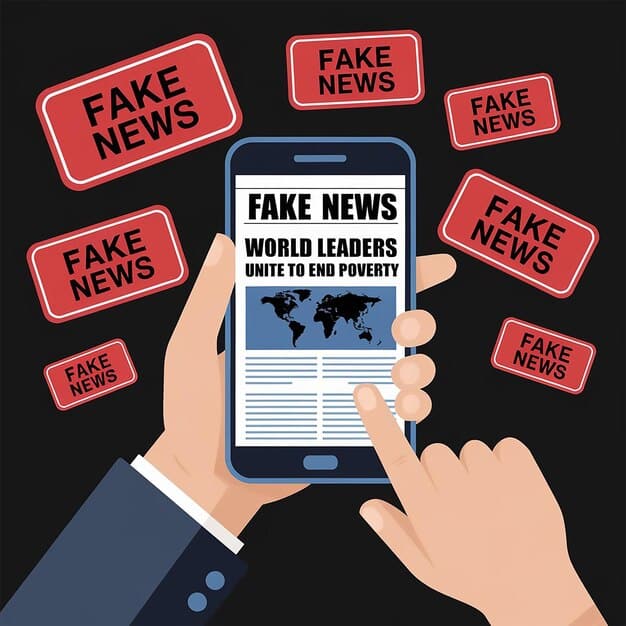Social Media’s Impact on Political Scandals: Exposing Truth or Spreading Misinformation?

Social media platforms have become powerful tools for exposing political scandals, offering unprecedented transparency and citizen engagement, but they also present challenges due to the spread of misinformation and the potential for manipulation.
The rise of social media has profoundly transformed the landscape of political discourse and accountability. Its role in exposing political scandals is undeniable, but this influence comes with significant caveats. Is it a force for transparency, or a breeding ground for misinformation?
The Double-Edged Sword of Social Media in Political Transparency
The role of social media in exposing political scandals has become increasingly prominent. Social media platforms enable rapid dissemination of information, bypassing traditional media gatekeepers. This allows citizens to directly engage with allegations of misconduct, leading to greater transparency and accountability.
However, the speed and reach of social media also present challenges. Misinformation can spread rapidly, and unsubstantiated claims can damage reputations and undermine trust in political institutions. The lack of editorial oversight on many platforms means that false or misleading content can quickly gain traction, influencing public opinion and potentially derailing legitimate investigations.

The Rise of Citizen Journalism
One of the most significant impacts of social media is the rise of citizen journalism. Individuals with smartphones can record and share events in real-time, providing an alternative perspective to traditional news sources. This can be particularly valuable in exposing corruption and abuse of power.
Citizen journalism empowers ordinary people to become active participants in the news cycle. However, it also raises questions about journalistic ethics and standards. Without professional training, citizen journalists may struggle to verify information or maintain objectivity.
- Increased transparency: Social media allows for immediate exposure of information, potentially deterring corruption.
- Citizen empowerment: Gives ordinary people a voice and a platform to share information.
- Challenges to traditional media: Provides alternative perspectives and challenges media gatekeepers.
- Potential for misinformation: Requires critical evaluation of sources and content.
The emergence of citizen journalism is reshaping the media landscape, fostering a more participatory and democratic approach to news dissemination. However, it also requires individuals to develop critical media literacy skills to distinguish between credible sources and misinformation.
Amplifying Voices or Echo Chambers?
Social media platforms can amplify marginalized voices and provide a space for activists to organize and mobilize. This can be particularly important in countries with restrictive media environments. However, the algorithms that govern social media feeds can also create echo chambers, where users are primarily exposed to information that confirms their existing beliefs.
Echo chambers can reinforce political polarization and make it more difficult for people to engage in constructive dialogue with those who hold different views. Confirmation bias, the tendency to seek out and interpret information that supports one’s pre-existing beliefs, can further exacerbate this problem.
The Role of Algorithms
Social media algorithms play a significant role in shaping the information that users see. These algorithms are designed to maximize engagement, often prioritizing content that is likely to elicit strong emotional responses. This can lead to the spread of sensationalist or misleading information.
While algorithms can personalize content and improve user experience, they also have the potential to create filter bubbles, where users are shielded from diverse perspectives. This can limit their understanding of complex issues and make them more susceptible to manipulation.
The Impact on Political Discourse
The prevalence of echo chambers and filter bubbles on social media can have a detrimental impact on political discourse. When people are primarily exposed to information that confirms their existing beliefs, they may become less tolerant of opposing viewpoints. This can lead to increased political polarization and gridlock.
Social media platforms have a responsibility to address the problem of echo chambers and filter bubbles. This could involve modifying algorithms to promote greater exposure to diverse perspectives, or implementing educational initiatives to help users recognize and avoid confirmation bias.
Social media platforms, while offering a space for diverse voices, can also create echo chambers reinforcing political polarization. Understanding how algorithms shape information exposure is vital for fostering constructive political discourse.
The Spread of Misinformation and Fake News
One of the most serious challenges posed by social media is the spread of misinformation and fake news. False or misleading content can spread rapidly on these platforms, often reaching millions of people before it can be debunked. This can have serious consequences, particularly in the context of political scandals.
The anonymity afforded by some social media platforms can make it difficult to trace the origins of misinformation. This can make it easier for malicious actors to spread false rumors or propaganda with impunity. Moreover, the lack of editorial oversight on many platforms means that false or misleading content can quickly gain traction.

The Role of Bots and Trolls
Bots and trolls play a significant role in the spread of misinformation on social media. Bots are automated accounts that can be used to amplify certain messages or spread propaganda. Trolls are individuals who deliberately try to provoke or harass others online.
Both bots and trolls can be used to spread false information or sow discord. They can also be used to manipulate public opinion or interfere in elections. Social media platforms need to take steps to identify and remove these malicious actors from their platforms.
- Rapid dissemination: False information can spread quickly and widely.
- Anonymity: Difficult to trace the origins of misinformation.
- Lack of oversight: False content can gain traction easily.
- Impact on public opinion: Misinformation can influence political views and decisions.
Combating Misinformation
Combating misinformation on social media requires a multi-pronged approach. This includes fact-checking initiatives, media literacy education, and algorithmic changes. Social media platforms also need to work with governments and civil society organizations to identify and remove false content.
Fact-checking organizations play a crucial role in debunking false claims and providing accurate information to the public. Media literacy education can help people to critically evaluate information and identify misinformation. Algorithmic changes can help to reduce the spread of false content and promote more diverse perspectives.
Combating misinformation on social media requires vigilance and collaboration. By working together, we can create a more informed and resilient online environment.
The Impact on Political Campaigns and Elections
Social media has become an indispensable tool for political campaigns and elections. Candidates use social media to connect with voters, raise money, and mobilize supporters. However, social media can also be used to spread misinformation or attack opponents. The potential for foreign interference in elections through social media is also a growing concern.
The use of social media in political campaigns and elections raises a number of ethical and legal questions. How can we ensure that campaigns are transparent and accountable in their use of social media? How can we protect voters from misinformation and manipulation? How can we prevent foreign interference in elections through social media?
The Use of Targeted Advertising
Targeted advertising is a powerful tool that allows political campaigns to reach specific groups of voters with tailored messages. This can be effective in mobilizing support or persuading undecided voters. However, targeted advertising can also be used to spread misinformation or exploit vulnerabilities.
Social media platforms need to provide greater transparency about the use of targeted advertising in political campaigns. This includes disclosing who is paying for the ads, who is being targeted, and what messages are being conveyed.
The Regulation of Political Advertising
The regulation of political advertising on social media is a complex and controversial issue. Some argue that political advertising should be subject to the same regulations as traditional advertising, while others argue that this would violate free speech principles.
Finding the right balance between protecting free speech and preventing misinformation is a difficult challenge. However, it is essential to ensure that political advertising on social media is fair, transparent, and accurate.
Social media’s impact on political campaigns and elections is profound. The ethical use of targeted advertising and the regulation of political ads are crucial for maintaining fair and transparent democratic processes.
The Role of Social Media in Holding Politicians Accountable
One of the most positive aspects of social media is its ability to hold politicians accountable for their actions. Social media provides a platform for citizens to voice their concerns, share information, and organize protests. This can put pressure on politicians to address issues of public concern and to act in a more ethical and responsible manner.
Social media can also be used to expose corruption and abuse of power. Whistleblowers can use social media to leak sensitive information to the public, bypassing traditional media gatekeepers. This can lead to investigations and prosecutions of corrupt officials.
The Power of Public Shaming
Public shaming is a powerful tool that can be used to hold politicians accountable. When politicians are caught engaging in unethical or illegal behavior, they can be publicly shamed on social media. This can damage their reputations and make it more difficult for them to wield power.
While public shaming can be effective, it can also be unfair or disproportionate. It is important to ensure that accusations are based on credible evidence and that individuals are given an opportunity to respond to the charges against them.
- Citizen engagement: Provides a platform for citizens to voice concerns and organize.
- Exposure of corruption: Allows whistleblowers to leak sensitive information.
- Increased accountability: Puts pressure on politicians to act ethically.
- Potential for unfairness: Public shaming can be disproportionate or based on false accusations.
The Limits of Social Media Activism
While social media can be a powerful tool for holding politicians accountable, it is important to recognize its limits. Social media activism is not a substitute for traditional forms of political engagement, such as voting, lobbying, and protesting.
Social media activism can be effective in raising awareness and mobilizing support. However, it is often not enough to bring about meaningful change. To achieve lasting results, social media activism needs to be combined with other forms of political engagement.
Social media plays a crucial role in holding politicians accountable, but it is essential to combine online activism with traditional forms of political engagement for meaningful change.
Building Trust and Critical Thinking in the Digital Age
In an era of rampant misinformation and political polarization, building trust and critical thinking skills is essential. Social media platforms need to take steps to promote media literacy and encourage critical evaluation of information. Governments and educational institutions also have a role to play in equipping citizens with the skills they need to navigate the digital landscape.
Building trust requires transparency and accountability. Social media platforms need to be transparent about how their algorithms work and how they are used to target advertising. They also need to be accountable for the content that is posted on their platforms.
Promoting Media Literacy
Media literacy education can help people to critically evaluate information and identify misinformation. This includes teaching people how to identify credible sources, how to spot fake news, and how to avoid confirmation bias.
Media literacy education should be integrated into school curricula and made available to adults through community education programs. Social media platforms can also play a role in promoting media literacy by providing educational resources and tools to their users.
Encouraging Critical Evaluation
Critical evaluation involves questioning assumptions, considering different perspectives, and weighing evidence. It is a skill that is essential for navigating the complex and often contradictory information that is available online.
Social media platforms can encourage critical evaluation by providing tools that allow users to see different perspectives on an issue and to verify information. They can also promote civil dialogue and encourage users to engage in constructive debate.
Building trust and critical thinking skills is essential for navigating the digital age. Media literacy education and the promotion of critical evaluation are key to combating misinformation and fostering a more informed public.
| Key Point | Brief Description |
|---|---|
| 📢 Citizen Journalism | Empowers individuals to report events, challenging traditional media. |
| 🌐 Echo Chambers | Algorithms can create echo chambers, reinforcing existing beliefs. |
| ⚠️ Misinformation | False news spreads rapidly, influencing public opinion. |
| ✅ Accountability | Holds politicians accountable via public scrutiny and whistleblowing. |
Frequently Asked Questions
▼
Social media enhances political transparency by enabling real-time information sharing, bypassing traditional media filters. This allows citizens to directly access and disseminate information about political events and scandals.
▼
Echo chambers are online communities where people primarily encounter information confirming their pre-existing beliefs. They form through algorithmic filtering, reinforcing confirmation bias and limiting exposure to diverse perspectives.
▼
Combating misinformation involves strategies such as fact-checking initiatives, media literacy education, and algorithmic adjustments. These steps aim to minimize the spread of false content and empower users to critically evaluate information.
▼
Social media enables campaigns to reach voters, fundraise, and mobilize support. However, it also poses risks of misinformation and foreign interference, necessitating ethical and regulatory considerations for fair political practices.
▼
Building trust involves encouraging media literacy, promoting critical evaluation, and demanding platform transparency. These approaches provide skills for discerning credible information amidst pervasive misinformation, thus fostering a more informed public.
Conclusion
In conclusion, social media’s role in exposing political scandals presents a complex duality. Its potential to enhance transparency and accountability is counterbalanced by the risks of misinformation and manipulation. Navigating this landscape requires critical thinking, media literacy, and proactive measures from both platforms and individuals to foster a more informed and trustworthy digital environment.





